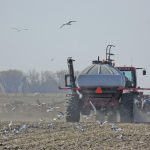The Canadian Organic Growers are pushing the federal government to recognize their sector in the federal Sustainable Agriculture Strategy, set to be published later this year.
"The [Sustainable Agriculture Strategy] is and can be a big opportunity, and organic and regenerative have a lot to offer," said Katie Fettes, COG's director of policy and research, in an online presentation yesterday.













